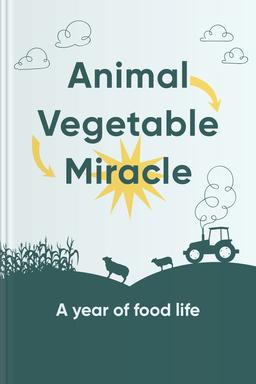What is Falter about?
This thought-provoking book explores the dire consequences of climate change and human activity on the planet. It examines the interplay between technology, economics, and the environment, questioning whether humanity is steering its own course towards disaster. McKibben challenges readers to confront the impending crisis and consider the choices that lie ahead, urging a reevaluation of our relationship with nature before it's too late.
Who should read Falter
- Environmental activists concerned about climate change
- Philosophers exploring human existence and futures
- General readers interested in sustainability and ecology
Animal, Vegetable, Miracle
by Barbara Kingsolver, Camille Kingsolver, Steven L. Hopp, PhD
What is Animal, Vegetable, Miracle about?
This enlightening narrative chronicles a family's journey towards self-sustainability over the course of a year. Emphasizing local farming and seasonal eating, the book intertwines personal anecdotes with detailed reflections on the environmental impact of food choices. Through engaging storytelling and practical advice, it encourages readers to reconnect with the origins of their food while promoting sustainable practices and a deeper appreciation for nature.
Who should read Animal, Vegetable, Miracle
- Food enthusiasts seeking sustainable eating habits.
- Eco-conscious individuals interested in gardening and farming.
- Families wanting to explore local food sources together.
What is No One is Too Small to Make a Difference about?
This powerful collection of speeches by a climate activist emphasizes the urgent need to address the climate crisis. Through passionate and direct language, it conveys the message that everyone, regardless of age or status, can contribute to significant change. The book calls for global awareness and action, challenging readers to confront the realities of environmental degradation and the responsibilities we all share in safeguarding the planet for future generations.
Who should read No One is Too Small to Make a Difference
- Young activists seeking inspiration and motivation.
- Environmentalists aiming to drive change and awareness.
- Concerned citizens wanting to understand climate urgency.
What is Beyond Coffee about?
This book explores the world of nootropics, adaptogens, and mushrooms, offering a comprehensive guide to enhancing mental performance and well-being. It emphasizes sustainable practices and natural ingredients that support cognitive function and resilience. Readers will learn about various herbal compounds, their benefits, and how to incorporate them into daily routines for improved health and productivity. A valuable resource for those seeking alternatives to traditional stimulants.
Who should read Beyond Coffee
- Health-conscious readers exploring natural alternatives.
- Biohackers seeking to optimize mental performance sustainably.
- Wellness enthusiasts interested in holistic lifestyle practices.
What is Vesper Flights about?
This collection of essays weaves together nature, memory, and personal reflection, exploring the profound connections between humans and the animal kingdom. Through lyrical prose, the author shares her encounters with various birds and other wildlife, revealing philosophical insights and intimate stories that highlight the beauty and fragility of the natural world. Each piece invites readers to contemplate their place within the ecosystem and the lessons nature imparts.
Who should read Vesper Flights
- Nature enthusiasts seeking lyrical prose
- Fans of personal memoirs and nature writing
- Readers interested in the intersection of science and art




